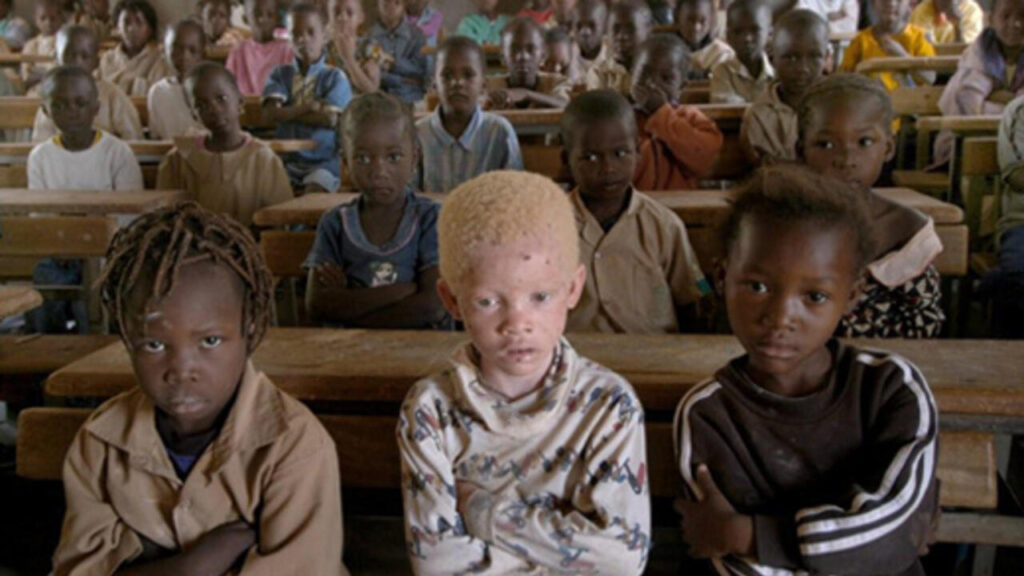
The case of 18-year-old Moszy, who landed on a Spanish beach along with several other refugees from Africa, has raised awareness of the plight of albinos in many African countries, where witchdoctors claim albino body parts can bring wealth and good luck.
The case of 18-year-old Moszy, who landed on a Spanish beach along with several other refugees from Africa, has raised awareness of the plight of albinos in many African countries, where witchdoctors claim albino body parts can bring wealth and good luck.
Albinism is an inherited genetic condition characterised by the absence of melanin in skin, eyes and hair and can affect all races. African albinos, easily spotted by their white skin and fair hair, have long been ostracised and discriminated against. The target of superstitions and sorcery, they are hunted down for their body parts, some of which are thought to confer magical powers.
‘We are human beings just like everyone else, only we need more care’
Mzawa Iddi Jagame is a member of the Tanzania Albino Society. Her account and the accompanying pictures were put together by Matteo Tortone and Alessandro Baltera of Olmo Produzioni.
It is very difficult in Tanzania, as in all sub-Saharan countries, to assert our equal dignity. We are human beings just like everyone else, only we need more care. For instance, we need to make sure our skin gets adequate protection from the equatorial sun, and in classrooms we need to have a place in the front row, or else we cannot see the blackboard. The Tanzania Albino Society was founded in 1979 and was recognised by the state in 1982. Three years ago we obtained a national day for albinos. It’s on April 26, and this year it will be celebrated in Mwanza, the capital of the province worst affected by massacres of albinos.”


©Alida Vanni. Tanzania Albino Society. The pictures were put together by Matteo Tortona and Alessandro Baltera of Olmo Produzioni.
‘Mothers often refuse to breastfeed albino babies’
Chiara Gregoracci is the founder of the Association of Handicapped Albino Youths of Cameroon and Africa (AJAHCA). An orphaned child, she was picked up by albino foster parents.
People here in Cameroon know little or nothing about albinos. There is a lot of ignorance and superstition. They are treated as outcasts, and parents don’t send them to school. Mothers often refuse to breastfeed Albino babies; and having albino children can sometimes lead to parents divorcing. So far we’ve been trying to find foster families for albino orphans, but we’ve already bought a plot of land to build a couple of houses, where the children can be looked after properly. Our aim is to ensure they can feel autonomous and build up their confidence. In time, we hope to convince the government to back our cause.”

Daniel (left) and George (right) were both abandoned by their parents before the AJAHCA helped them find foster families.
‘There is an old belief, that when the volcano erupts, only albino blood can placate the god of the mountain’
Stefan arrived in Italy two years ago after fleeing his native Cameroon. A trained journalist, he was granted asylum on humanitarian grounds and now lives in Turin.
I left my country to escape the widespread prejudice targeting albinos such as me. People are starting to talk more and more about the plight of albinos in Tanzania, but things are much the same in Cameroon. Different parts of our bodies are sought for their supposed miraculous powers: to become rich, win elections or concoct love potions.
In south-west Cameroon, where I studied, there is an old belief that when the local volcano erupts, only albino blood can placate the god of the mountain. When I was fifteen, we found the body of my elder brother, also an albino, with his heart and testicles removed. I was forced into hiding several times.
It was very hard for me to cope with other people’s scorn. My parents insisted I get a proper education, but there is no special treatment for albinos with poor eyesight. Still, I managed to complete university degrees in journalism and English literature.
There is a lot to be done in countries such as Cameroon to ensure albinos have access to healthcare and education. But we must do our bit to educate other people and raise awareness of such major dangers as skin cancer. We must persuade other people and the government to make it possible for albinos to play their part in society.”